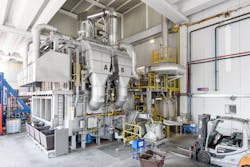Auto Wheel Producer Adopts Chip Recycling
Cromodora Wheels SpA is operating a new gas-fired furnace for recycling aluminum chips at a rate of 10,000 metric tons/year at its plant in Ghedi, Italy. The Ecomelt furnace, developed by SMS group's Hertwich Engineering division, achieves energy-consumption performance of less than 600 kWh/t / (930 BtU/lb), taking into account chip drying and combustion.
Cromodora Wheels produces cast Cromodora Wheels used for performance racing, and aluminum wheels for production-scale passenger vehicles, counting among its customers BMW, Jaguar Land Rover, Daimler (including AMG and Smart), Porsche, Audi, Volkswagen, Skoda, Fiat, Maserati, and Alfa Romeo.
The wheels are manufactured by low-pressure casting and flow forming technology. With the newly commissioned Ecomelt furnace, Cromodora is modernizing the recycling of its scrap byproducts.
In wheel production, machining chips regularly accumulate along with variable quantities of scrap. Chip recycling is challenging, because of the unfavorable ratio of surface area and volume causes a significant material loss through burn-off. The traditional method for recycling chips is to compact the material before melting, which reduces the metal loss. However, this is an additional step and requires more energy consumption. In addition, the chips are frequently contaminated with cooling lubricants left over from the grinding and machining processes.
The Hertwich Engineering recycling system offers a more economical solution, as long as there is a sufficiently large volume of chips. With the combination of the Ecomelt concept and a customized plant technology, metal losses are very low.
In addition to the melting furnace, the scope of supply includes chip pre-treatment equipment and a bypass system for conveying chips into separate transport containers. During pre-treatment the chips are centrifuged, and misshapen or odd-sized chips are processed in a crusher to ensure stable further processing, wherein undesirable elements are removed by a separator.
Then, the prepared chips are fed into the melting furnace. First, the charged chips are heated to approximately 400°C within a few seconds using an intensive hot gas flow that removes moisture and organic contaminants. The energy is provided by hot gas from the melting chamber and flue gases from the dryer.
Preheated and cleaned chips are continually fed into the downward directed melting flow and immediately drawn under the bath surface, toward the furnace bottom. Fast melting almost completely avoids metal loss due to oxidation — and, as a result, dross formation also is low. Heat is removed to a very large extent from the flue gases in a regenerative combustion system and used to preheat combustion air to approximately 900°C.
According to the furnace developer, the Ecomelt process achieves a series of advantages:
• Chip recycling process is integrated into the automated in-house material transport, ensuring continuous operation.
• Metal loss values below 1.0% prcent are achieved during operation — exceeding the value of conventional furnaces melting ingots, which means metal recovery is maximized.
• Ecomelt technology results in low energy costs. The furnace achieves energy performance of less than 600 kWh/t / (930 BtU/lb), combining the energy consumed for chip drying and combustion.
• The plant provides a ecological benefits too, reliably meeting the strict European regulations on furnace emission.
The quality of the metal produced by Ecomelt technology has been confirmed by independent evaluation carried out during the development process, showing that even in the untreated state the metal recovered by chip recycling is comparable to the melt ready for casting in regard to non-metallic inclusions.
Thanks to the automation package provided to Cromodora, the complete, 10,000-metric tons/year plant, can be operated by one operator per shift – adding further to its economic efficiency.
